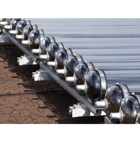Renewable energy at your leisure

Energy costs in a typical sports centre are second only to labour, accounting for as much as 30% of total running costs. Paul Sands of Stokvis Energy Systems explains how solar-thermal water heating can help cut energy usage and fuel bills in the leisure sector.
All the numbers relating to the Sun are mind-numbingly large. For example, it's ancient — at 4.6 billion years old. It's hot — with a surface temperature around 5500°C and a core temperature of 15 million degrees Centigrade. And it's big - the sun's mass is a staggering 1.989 x 10^30 kg and the Earth could fit inside it around a million times.
However, one of the most compelling statistics about the Sun from a building services perspective is that the solar energy received by the Earth in just 30 minutes is the equivalent to all the energy used by the entire human population in a year.
Harnessing just a fraction of this energy can cut fossil-fuel derived energy output dramatically — as well as shrink carbon emissions and slash fuel bills. And that is where solar-thermal water heating comes in, especially for leisure centres and sports facilities.
Leisure centres require enormous quantities of heat, not only to ensure a comfortable space, but also for hot water to service showers, cafés, swimming pools and so on. Solar heating can supplement the water-heating requirements.
According to the Carbon Trust, UK leisure facilities could save up to £70 million each year and reduce carbon emissions by hundreds of thousands of tonnes simply by making a 10% improvement in the management of energy use.
Solar panels have a significant part to play in achieving this improvement. The Carbon Trust again: ‘Solar water heating can be very effective for swimming pools and is relatively easy to connect to a conventional heating system. Unglazed solar collectors perform well in summer and are generally the cheapest to buy and install.
‘Glazed collectors provide more energy in spring and autumn and can give a substantial contribution to pool heating throughout the year, with the remainder provided by a conventional heating system.’
Many leisure centres are equipped with modern boilers running on gas or other fossil fuel to offer reliability of both heating and hot water. But employing even the latest modulating gas boilers to supply hot water to large buffer vessels is not the best option.
Even well insulated storage vessels lose heat, causing the boiler to cycle on and off as the temperature drops. Even having solar coils connected into the system will not alter the situation. Maintaining the temperature will still waste fuel, and this is exacerbated by the need to provide regular temperature boosts to kill potential legionella bacteria in the water.
It is far more efficient to have an array of solar panels storing the free energy collected within what serves as a preheat storage vessel. This way, the temperature of incoming water from the mains or a borehole can be raised. And, when the temperature of the water needs to be raised further, a boiler in conjunction with a plate heat exchanger (PHE) can achieve this efficiently and instantaneously.
Paul Sands is sales director of Stokvis Energy Systems.







